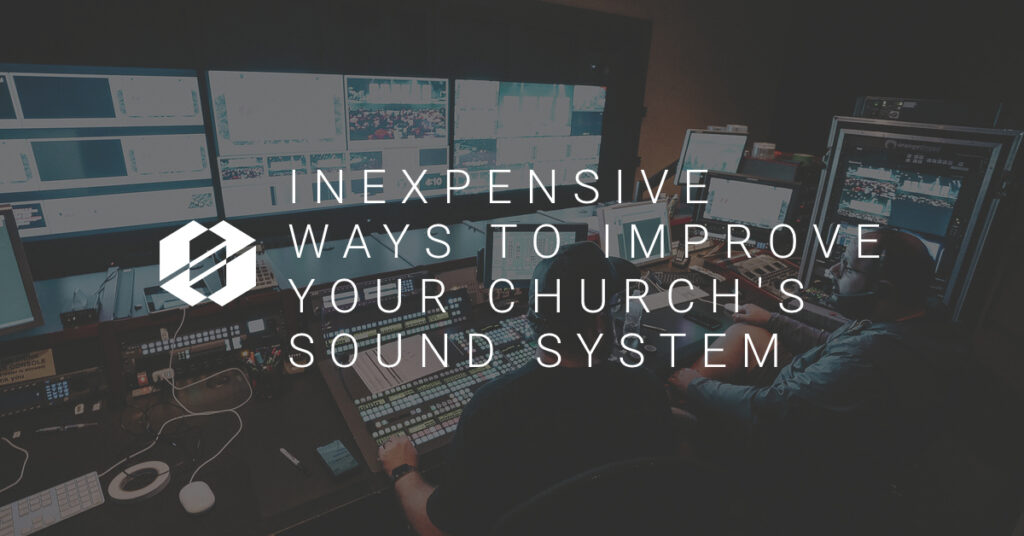Churches are known for having bad sound. This is especially true of smaller churches without paid tech staff. This bad sound can be the result of bad equipment, good equipment that is improperly used or just a lack of caring about how things sound. This is really too bad. When someone comes to church and leaves exhausted because of really terrible sound, the church has done them a disservice. And, they’re unlikely to return. They may not even be able to articulate why they didn’t like it, but if you dig, you may discover they just couldn’t hear.
With that in mind, below are a few simple suggestions on how to improve your church’s sound system that can go a long way toward making the church-going experience a better one.
1. Flatten it out
The first way to improve your church’s sound system is an inexpensive fix. In fact, the best thing about this tip is that it’s not just inexpensive, it’s free. Very often, after months of mixing from the same scene or board setup, you’ll find far more EQ or compression than needed, EQ on the LR buss that really isn’t required and gain structure that is way off. I like to run a baseline show file or scene that resets the desk to a known good state each week, but if you pick up where you left off last week, zero it out once in a while. I have seen consoles with every gain knob at full cut and they wonder why it sounds so bad. Zero it out, and start over clean.
2. Have your PA professionally calibrated
I remember visiting a church to look at their system some years back. They had a 31-band equalizer between the mixer and the amps, and every single band was at 15 dB. Every. Single. Band. For even better sound, they also had an 8-band feedback eliminator in the chain that was also at full cut on every band. As you may imagine, it sounded amazing. When I inquired, they said the speakers were too loud so they turned down the EQ to make it quieter.
If that’s your idea of how to calibrate a PA, and improve your Church’s sound system it’s time to bring in a pro. If you don’t recognize the incredible amount of sarcasm in the previous paragraph, it’s time to bring in a pro. Or, if you’re not sure how to set up a crossover, time align subs to mains or make the delays seem completely transparent, it’s time to bring in a pro. I know many guys who can extend the life of a less than ideal PA by simply calibrating it properly. This gives the church time to save money for a properly designed and installed speaker system.
3. Train your audio engineers
If you want to improve your Church’s sound system sometimes the easiest thing to do it train your audio engineers. However, for some reason, very few churches want to do this. I’m not sure why, but I’m going to go with ignorance. There seems to be a lack of understanding on the part of leadership on just how hard it is to put together a good mix. Pastors have asked if I can come to their church (during the week) and “dial in their mix so the volunteers can just recall it every weekend.” While it is true I could create a baseline file that would give them a good starting point, it still has to be mixed. Mixing is a weird blend of art and science and if your people don’t know what they’re doing, you’ll never get good results.
I’ll never understand how a church is willing to spend $50,000, $100,000 or more on a new PA or console but balks at spending a few thousand dollars to bring in a top-notch pro to train their team. I was once asked if I could fly half-way across the country, spend a weekend with a volunteer team and train them. Happy to do so, I gave them the cost (about $3,000 including travel). The pastor sighed and said, “Hmmm, we budgeted $500.” Needless to say, I didn’t take them up on that generous offer.
4. Replace broken or damaged equipment
A friend of mine was rather unhappy about the sound of their speaker system. His displeasure was not unfounded, I had heard it and it sounded terrible. One day he decided to do some investigating. He sent me pictures of the low frequency drivers with torn cones, and both high frequency drivers were blown completely. This may come as a shock, but it’s tough to put up a great mix on a set of blown speakers. What they really needed was a new PA designed for the room, but they didn’t yet have the funds. However, for a few hundred dollars in new components, they were at least able begin by producing the entire frequency range. This is more common than you think it is.
5. Have the PA re-hung
The last thought I have on how to improve your church’s sound system, is in regards to installation. Sometimes, a church will have a good collection of equipment for speakers, but they are not installed properly. Occasionally, there are too many speakers in a room—yes, that can cause more problems than it solves—and taking some down will improve sound dramatically. This is another example of having a trained professional come in and evaluate the system.
One caveat to this, however; re-hanging the wrong PA for the room will still result in the wrong PA for the room. It may be a case of throwing good money after bad. Sometimes it’s better to bite the bullet and have the entire system overhauled with new gear than spend more on bad. This is situation-dependent and a quality professional will help you sort it out.
Not all of these solutions are what some might thing of as “inexpensive,” often read, “free.” This is true because high quality sound costs money. The larger the room, the larger the price tag. However, people come to your church to hear the Gospel. Are you not obligated to make the hearing as easy as possible? I suggest each church should make high-quality sound a top priority.
Want to go deeper? Mike Sessler teaches a 12-part series on SALT University, called The Art of Mastering The Live Mix.





